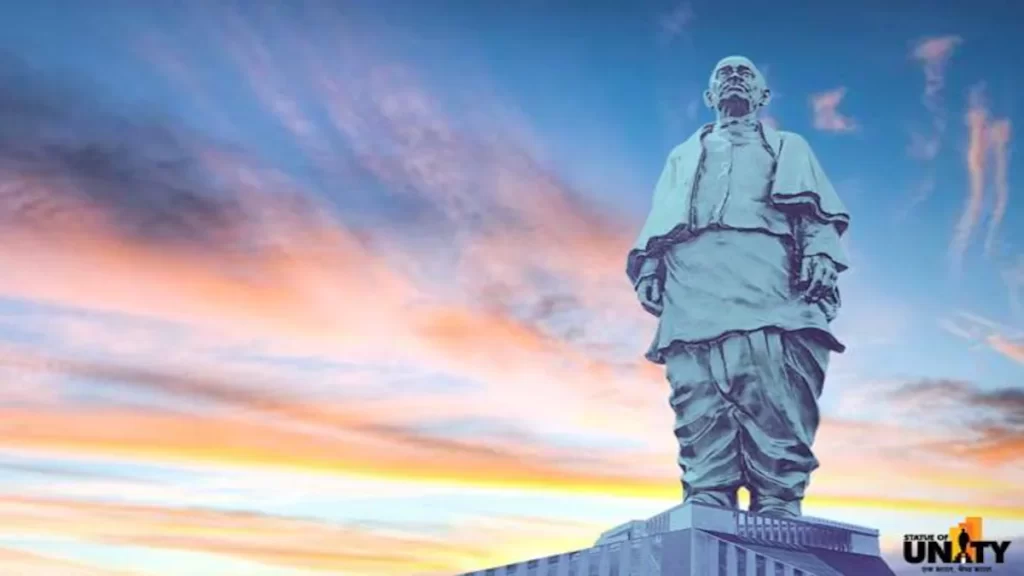A noble and brave heart who made a great sacrifice for the entire nation. He was an Indian politician and statesman, but more importantly, he was the first Home Minister of India.
About Vallabhbhai Patel
Vallabhbhai Patel was a politician and statesman of the Indian National Congress. He was also known as “Iron Man of India”. Vallabhbhai Patel was born in Patan, Gujarat on October 31, 1875. His father died when he was 10 years old.
Life of Patel
Birth
Vallabhbhai Patel was born on October 31, 1875 in a village named Karamsad near Petlad in Gujarat. His father, Jhaverbhai Patel was a Patidar. When he was nine years old, his father died of typhoid. He then went to live with his uncle, Dhanjibhai at Nandesari. At the age of 16, he was married to Girdhariben. Later on he worked as a school teacher for about two years.
Study
In 1892 Vallabhbhai Patel went to London to study law. He got admission at the University College of Law. After completing his studies, he returned to India and started practicing in the year 1900. Dharma Sabha
Vallabhbhai Patel was deeply attached with the nationalist movement of India. In the year 1900, he joined a society called “Deshbandhu”, which was an organization of nationalists. This was the time when there was a large scale revolt against British Rule in Gujarat. The British government is also looking for ways to suppress the revolt. Vallabhbhai Patel got arrested and jailed for five years. In this period he came in contact with Gyani Shumsher Jung Bahadur Rana, a former Prime Minister of Nepal and Harilal Dhiren Mukherjee, an Indian revolutionary and started social work among his fellow prisoners.
Practice
He practiced in several high courts. In 1914, he was appointed as the President of the Gujarat High Court. He also served as a member of the Central Legislative Assembly. From 1937 to 1946, he was the Home Commissioner of Bombay. At this time he became a close associate of Mahatma Gandhi. In 1942, he was appointed as the first Home Minister of the Government of India and served till 1947.
Satyagraha in Gujarat
In the year 1921, Vallabhbhai Patel took part in “satyagraha” which is a non-violent form of protest or resistance. He was arrested and jailed for six months in 1922. During this time, he came in contact with Mahatma Gandhi, who was then leading the back to back satyagraha movement. At the time of independence, he offered his services to the new government and worked as the Deputy Prime Minister of India from 1947 to 1950.
Political Career
He always remained with the Indian National Congress. Patel became the president of the Gujarat Pradesh Congress Committee in 1916. He also served as the Home Minister of India. In 1936, he was elected as a member of Parliament from Gujarat. He was re-elected as a member of Parliament in 1946. He also became the Minister of Home Affairs in 1947.
Cabinet Minister
Vallabhai Patel’s first appointment as a minister was in 1937 when he was called to form part of an interim government which had been formed to deal with the political crisis in Bombay. He became the head of the first Congress ministry in Bombay and remained so until 1943 when he resigned owing to his differences with other Congress leaders on certain issues.
Hindi-Urdu controversy and Partition
In 1946, the question of whether Hindi or Urdu should be the national language of India became a controversial issue. On July 30, 1947, at a meeting held at Delhi’s Ramlila Maidan, Congress leader Purushottam Das Tandon presented his draft constitution. According to Tandon’s constitution, Hindi language would be given preference over Urdu as the official language in post-British India.
However, this caused a major rift between the pro-Hindi and pro-Urdu groups within the Congress. While the pro-Hindi group was led by Jawaharlal Nehru, Patel and Aditya Birla strongly opposed it. After much disagreement, a compromise was reached whereby both languages would have equal status in government and the judiciary.
The agreement did not end the matter completely; still, it marked a significant step towards solving an issue that had divided India for years.
Ban on RSS
In June 1948, Vallabhai Patel was the Minister of Home Affairs. When he learned that RSS was using secret funds to spread its ideology and recruiting young members, he banned it. He also ordered the arrest of the founder members of RSS, which included Bal Gangadhar Tilak. He also arrested many RSS members in Gujarat.
Patel’s contribution to Indian politics
Vallabhbhai Patel has remained a major influence on contemporary Indian politics. His main contribution was his role in unification of various parties that were struggling against British Rule. He was the main leader of the Patel community and was directly connected with leaders like Sardar Vallabhbhai Patel, which has made him a major political force in India. He is also known as “Rebel without a Pause”.
Death
He died on December 15, 1950 at the age of 75 after a long and serious illness. He left behind his wife and several children. His personal belongings were donated to their offspring during his last days when everyone was in great sorrow for such a great loss of an old friend and patriot.
